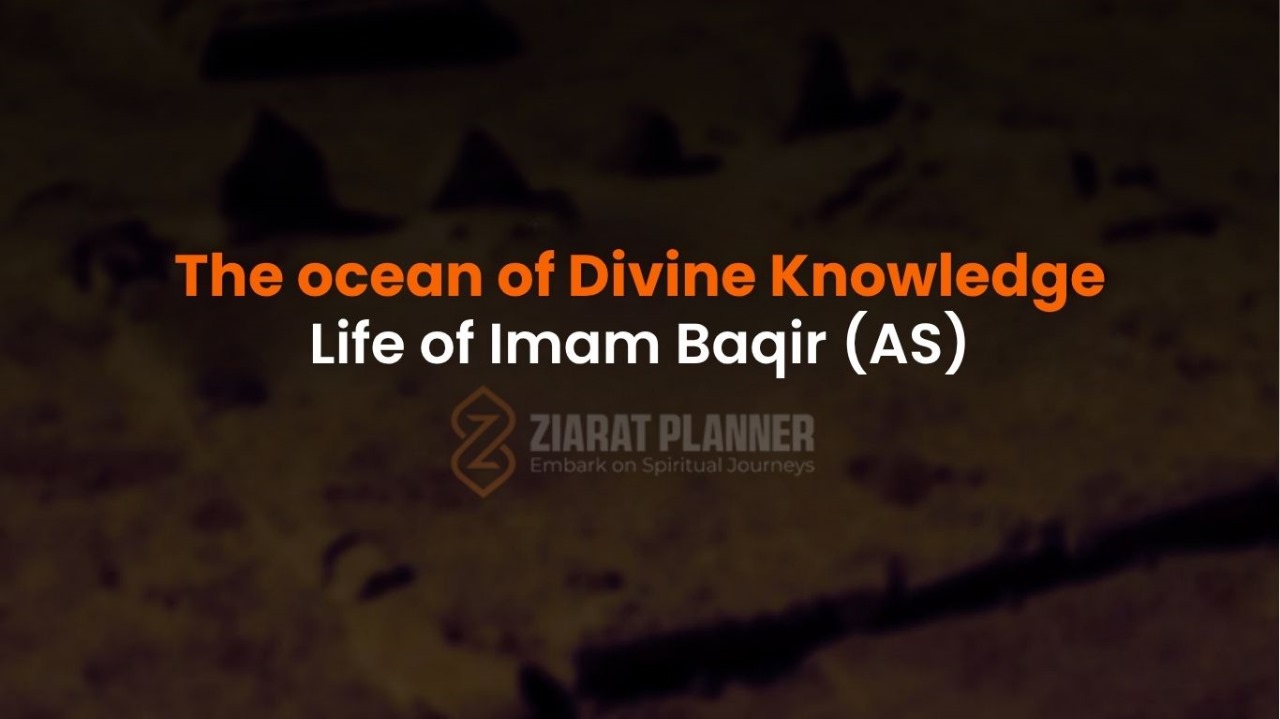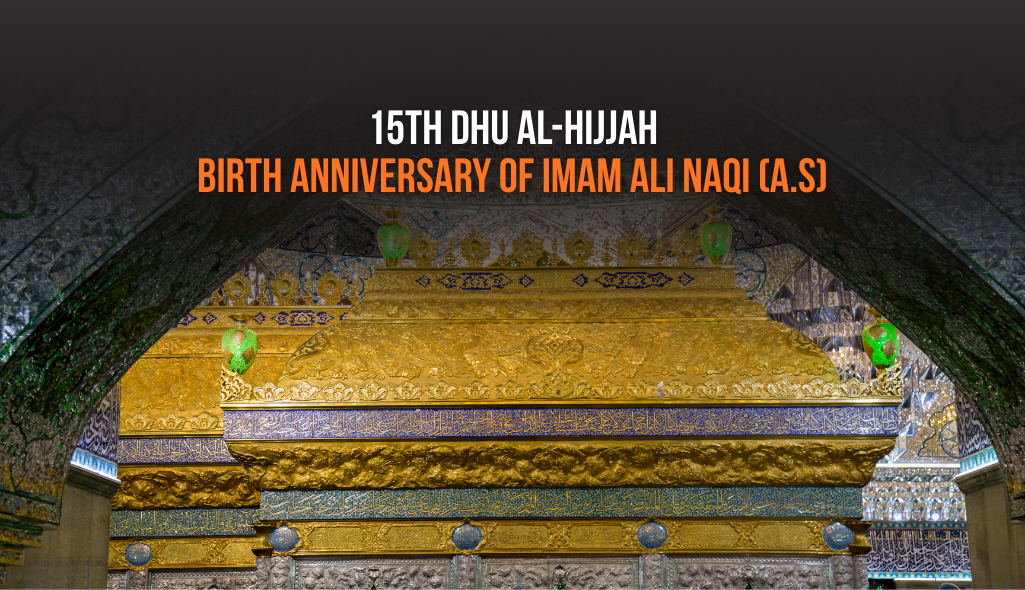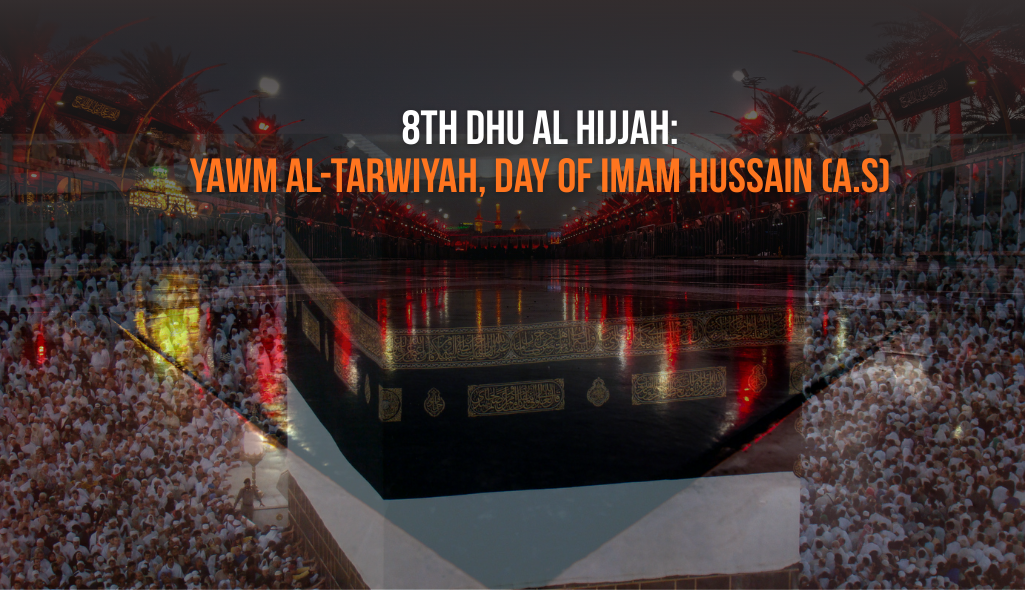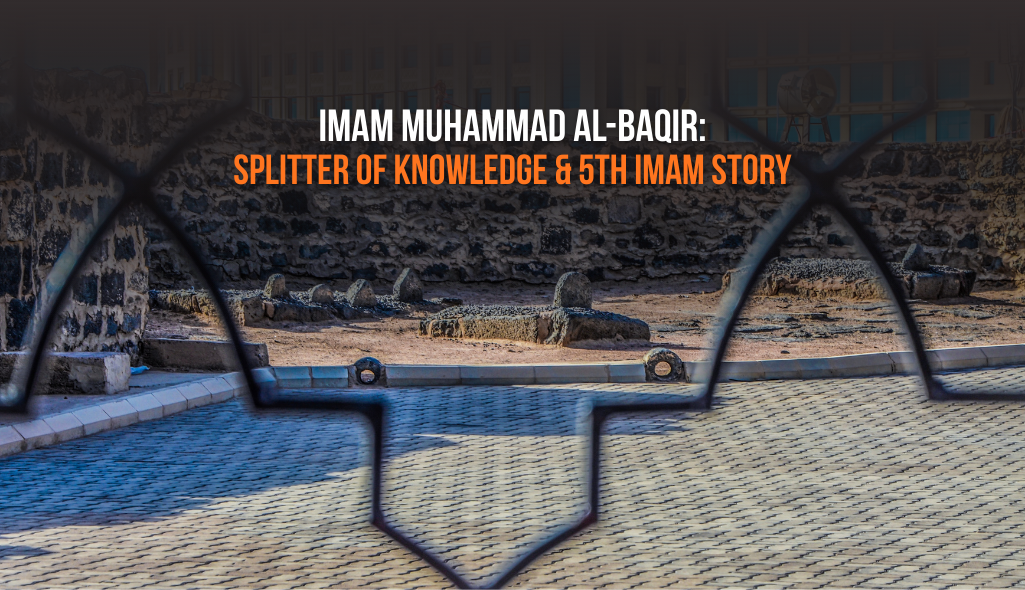The ocean of Divine knowledge –Life of Imam Baqir AS

Introductory Words
Throughout Islamic history, certain personalities have illuminated the world with their wisdom, spiritual insight, and divine knowledge. Among these revered figures is Imam Muhammad al-Baqir (A.S.), the fifth Shia Imam and a direct descendant of both Imam Hasan (A.S.) and Imam Husayn (A.S.). He is widely known by the title “Baqir al-Uloom”, meaning “the one who splits open knowledge.”
Imam al-Baqir (A.S.) lived during a critical time in early Islamic history, when the oppressive Umayyad regime was actively suppressing the true essence of Islam. In such a stifling atmosphere, Imam Muhammad al-Baqir (A.S.) emerged as a beacon of Islamic scholarship, spiritual revival, and moral resistance. His profound contribution to Islamic jurisprudence (Fiqh), Quranic exegesis (Tafsir), and the establishment of Shia theology marked the beginning of a major intellectual movement in the Muslim world.
The title “Baqir al-Uloom” was not simply a scholarly honor but a divine recognition, first foretold by the Holy
Prophet Muhammad (PBUH) himself in authentic Hadiths reported by companions such as Jabir ibn Abdullah al-Ansari. It signifies Imam al-Baqir’s (A.S.) unparalleled ability to delve deep into the oceans of divine knowledge and uncover its hidden treasures.
He transformed the city of Medina into a vibrant center of Islamic learning, attracting thousands of students, scholars, and seekers of truth. His disciples included some of the most prominent names in early Islamic scholarship, who went on to preserve and transmit the authentic teachings of Ahlal-Bayt (A.S.).
The life of Imam Muhammad al-Baqir (A.S.) teaches us that true knowledge is not just theoretical it must be rooted in piety, sincerity, justice, and wisdom. His legacy continues to inspire modern scholars, students, and spiritual seekers across the globe.
In this blog series, we will explore the life, teachings, and unmatched legacy of *Imam al-Baqir (A.S.) his
family lineage, intellectual contributions, moral excellence, and the historical impact he left on Islamic
civilization. Through this journey, readers will not only learn about his biography but also find timeless
lessons for their own spiritual and intellectual growth.
Lineage and Noble Family of Imam Muhammad al-Baqir (A.S.)
Imam Muhammad al-Baqir (A.S.), the fifth Imam in Shia Islam, belonged to the most revered and spiritually elevated family in Islamic history the Ahl al-Bayt. His noble lineage traces back directly to the Holy Prophet Muhammad (PBUH) from both parental lines, making him a unique descendant of both Imam Hasan (A.S.) and Imam Husayn (A.S.).
The Blessed Birth of a Beacon of Knowledge. Imam Muhammad al-Baqir (A.S.) was born on the 1st of Rajab, 57 AH (677 CE) in the sacred city of Medina. His birth came at a time of political unrest and religious distortion within the Islamic world, but his arrival brought a spiritual light that would guide generations. The birth of Imam al-Baqir (A.S.) was a source of immense joy for the Ahl al-Bayt and a divine sign of continuity of prophetic knowledge and wisdom.
The Naming: A Prophetic Foretelling Fulfilled. Upon his birth, his noble father Imam Zayn al-Abidin (A.S.) named him Muhammad, in honor of his greatgrandfather, the Holy Prophet (PBUH). This naming held special significance. It was not arbitrary the Prophet Muhammad (PBUH) himself had foretold his coming in a famous hadith reported by Jabir ibn Abdullah al-Ansari:
O Jabir! You will live long enough to meet a son of mine from the lineage of Husayn, whose name will be Muhammad. He will split open knowledge (Baqir al-‘Ilm) just as the earth is split open to reveal its treasures. Thus, he came to be known as Baqir al-Uloom The Splitter of Knowledge.
Parental Heritage: A Unique Lineage of Light Father: Imam Zayn al-Abidin (A.S.)
Imam al-Baqir’s father, Ali ibn Husayn (A.S.), also known as Imam Zayn al-Abidin, was the lone adult survivor of the Tragedy of Karbala. He is known for his unparalleled devotion, humility, and the spiritually
rich Sahifa Sajjadiya, a masterpiece of supplication and divine connection.
Mother: Fatimah bint Imam Hasan (A.S.) His mother was Fatimah, the daughter of Imam Hasan al-Mujtaba (A.S.), making him the only Imam who descended from both grandsons of the Prophet (PBUH). This dual heritage Hassani and Hussaini granted Imam al-Baqir a truly unique spiritual stature among the Imams.
A Witness to Karbala at a Young Age Though only a child at the time, Imam Muhammad al-Baqir (A.S.) was present at Karbala and witnessed firsthand the brutal massacre of his grandfather Imam Husayn (A.S.) and the suffering of the Prophet’s family. These painful scenes left an indelible mark on his soul, shaping his later mission to revive Islam through knowledge, patience, and silent resistance.
🌟 A Legacy Rooted in Prophetic Light
The family tree of Imam Muhammad al-Baqir (A.S.) is not just a genealogical fact it is a spiritual chain that connects the divine light of prophecy to the intellectual and moral revival of Islam. Raised under the
guidance of two infallible Imams and molded by the tragedy of Karbala, Imam al-Baqir grew into a symbol of sacred scholarship and unmatched wisdom.
Early Genius: Imam Muhammad al-Baqir’s Childhood Brilliance From a very young age, Imam Muhammad al-Baqir (A.S.) displayed an extraordinary intellect and deep spiritual maturity. He quickly absorbed the teachings of the Qur’an and Hadith, showing an exceptional understanding that far exceeded his age.
A Child Among Scholars As a child, he frequently attended the scholarly gatherings of his father, Imam Zayn al-Abidin (A.S.). He not only listened but also engaged in deep discussions, answered complex religious questions, and impressed scholars with his clarity and insight. His early signs of genius were a reflection of the divinely inspired knowledge (Ilm-e-Ladunni) that he carried as an Imam.
The Height of Knowledge: Scholarly Status and Greatness
“Baqir al-Uloom” – The Splitter of Knowledge
The Holy Prophet Muhammad (PBUH) bestowed upon him the title “Baqir al-Uloom”, meaning “the one who splits open the depths of knowledge.” This title was not metaphorical it reflected Imam al-Baqir’s unparalleled ability to explore, explain, and expand the ocean of divine knowledge.
His Contributions to Islamic Sciences Imam al-Baqir (A.S.) made foundational contributions to a wide range of Islamic disciplines, including: Fiqh (Islamic jurisprudence) Tafsir (Qur’anic interpretation) Hadith sciences Kalam (Islamic theology) Philosophy and spiritual ethics
He formulated principles and methodologies that later enabled his son, Imam Ja’far al-Sadiq (A.S.) to establish a world-renowned Islamic seminary. Through this foundation, the Jafari school of thought was
systematized and spread.
Medina: A Center of Knowledge Under His Leadership Under Imam al-Baqir’s guidance, Medina became the hub of Islamic learning. Thousands of students from various regions and schools of thought came to learn under his supervision. His sessions were not limited to Shia followersscholars from all over the Islamic world sought his wisdom.
His Most Prominent Students Among the many distinguished scholars who learned from him, some of the most notable include:
Jabir ibn Yazid al-Ju’fi
Zurarah ibn A’yun
Humran ibn A’yun
These students became pillars of Islamic jurisprudence, Quranic commentary, and spiritual insight, preserving the pure knowledge of the Ahl al-Bayt (A.S.) for future generations.
Debates, Dialogues, and Intellectual Courage Imam al-Baqir (A.S.) was known for his fearless engagement in theological debates with Umayyad rulers and their court scholars. His calm, reasoned, and truth-driven arguments dismantled false ideologies and reaffirmed the authentic teachings of Islam. He fearlessly refuted false doctrines and defended the integrity of Islamic belief in public settings. His knowledge was not only vast it was empowering and liberating for those seeking truth.
The Legacy of a Divine Knowledge Movement Imam Muhammad al-Baqir (A.S.) revived, preserved, and spread the true spirit of Islamic knowledge at a time when ignorance and distortion threatened its core.
His Scholarly Movement Achieved:
Revival of Prophetic knowledge
Spiritual awakening of the Muslim Ummah Establishment of an intellectual foundation for future generations of scholars He taught that knowledge is not just a collection of words—it must be reflected in *character, piety, wisdom, and justice.
Political and Social Conditions in the Era of Imam Muhammad al-Baqir (A.S.)
Oppression Under the Umayyad Caliphate The life of Imam Muhammad al-Baqir (A.S.) unfolded during the peak of the Umayyad dynasty, a regime that claimed to rule in the name of Islam but had, in reality, strayed far from the true teachings of the Prophet Muhammad (PBUH).
The Umayyad rulers prioritized power politics over faith, using religion as a political tool. The Ahlal-Bayt (A.S.) were under constant surveillance, their movements restricted, and their influence among the people deliberately suppressed. The regime promoted court scholars who aligned with their political goals, while true religious scholars were marginalized or silenced.
Moral Decline and Religious Deviation in Society During this era, the broader Muslim society experienced:
A general disconnect from the true spirit of Islam Widespread misinterpretation of the Qur’an The rise of fabricated hadiths replacing authentic Sunnah State sponsored scholars spreading distortions while silencing genuine voices of knowledge This was a time of intellectual darkness, spiritual confusion, and moral deterioration in the Islamic world.
Imam al-Baqir’s Revolutionary Role Reviving the Ummah Through Knowledge.
In this suffocating environment, Imam Muhammad al-Baqir (A.S.) chose not to confront tyranny with swords but with wisdom and knowledge:
He established Medina as a center of Islamic education, offering access to the pure teachings of the Prophet (PBUH) and the Qur’an. Through public discussions, scholarly debates, and the training of brilliant students, Imam al-Baqir (A.S.) fought against religious distortion and ignorance.
A Silent Revolution Against Falsehood Rather than launching a political revolt, the Imam focused on moral and intellectual resistance. His approach taught that true reform does not always require violence—sometimes, patience, knowledge, and strong character are even more powerful.
A Torchbearer of Truth in a Time of Darkness Imam Muhammad al-Baqir (A.S.) preserved the true essence of Islam through knowledge, wisdom, and spiritual resilience, during one of the most corrupt and oppressive periods in Islamic history. His legacy stands as a blueprint for reform—showing us that in times of confusion and falsehood, truth can still rise through education and character.
Martyrdom of Imam Muhammad al-Baqir (A.S.) A Silent Sacrifice for Truth Background: Threat to the Umayyad Regime As the intellectual and spiritual influence of Imam Muhammad al-Baqir (A.S.) continued to grow, the Umayyad rulers became increasingly anxious. His teachings were awakening the masses and challenging the legitimacy of the corrupt regime. Though he never led an armed revolt, his peaceful resistance through knowledge was more powerful and far-reaching. The Imam’s popularity among scholars and common people posed a direct threat to the authority of the Umayyad caliphs.
The Assassin: Who Killed Imam al-Baqir (A.S.)?
Imam Muhammad al-Baqir (A.S.) was poisoned by order of the Umayyad caliph Hisham ibn Abdul Malik.
Historical accounts suggest that the poison was administered secretly through the governor of Medina, who acted under Hisham’s instructions. The Imam suffered severe pain for several days before attaining martyrdom, enduring it all with patience and submission to God.
Date of Martyrdom. The martyrdom occurred on 7th Dhul-Hijjah, 114 AH, corresponding to approximately 733 CE.
Imam al-Baqir (A.S.) was about 57 years old at the time of his death.
Final Resting Place: Jannat al-Baqi
Imam Muhammad al-Baqir (A.S.) was laid to rest in Jannat al-Baqi, the sacred graveyard in Medina.
His son, Imam Ja’far al-Sadiq (A.S.), led the funeral prayer.
He was buried alongside other revered Imams of the Ahl al-Bayt, including: Imam Hasan al-Mujtaba (A.S.) Imam Zayn al-Abidin (A.S.)
Later, Imam Ja’far al-Sadiq (A.S.) was also buried nearby.
Impact of the Martyrdom The Imam’s martyrdom marked the loss of one of the greatest minds of the Ahl al-Bayt, but his legacy of knowledge lives on. His son and successor, Imam Ja’far al-Sadiq (A.S.), carried the mission forward by expanding the intellectual revolution.
His death is a reminder that true leadership in Islam demands sacrifice, not power.
Imam Muhammad al-Baqir (A.S.) sacrificed his life in the path of preserving the true spirit of Islam. His martyrdom teaches us: Even when the sword is not drawn, truth can pierce through the darkness with the pen and the spirit of sacrifice.
Shrine of Imam Baqir (a.s.) in Jannat al-Baqi
Jannat al-Baqi is a historic cemetery in Madina where many revered figures of Islam are buried, including the Ahlal-Bayt (a.s.), the noble wives of the Prophet (PBUH), prominent companions, and thousands of saints. Among these great personalities lies Imam Hasan al-Mujtaba (a.s.) the beloved grandson of the Prophet Muhammad (PBUH), Imam Zain ul Aabideen A.S , Imam Al Baqir AS and Imam Al Sadiq AS.
Historical Significance of the Shrine Imam Al Baqir (a.s.) was martyred in 114 AH in Madina. He was buried in Jannat al-Baqi, and for centuries, a beautiful shrine with a dome stood over his grave. It served as a sacred place of visitation for Muslims from around the world.
Destruction of the Shrine In 1324 AH / 1925 CE, with the rise of the Al Saud regime, and under the influence of Wahhabi ideology, the shrine of Imam Al Baqir (a.s.) along with the graves of other members of Ahlal-Bayt (a.s.) was demolished. The entire cemetery of Jannat al-Baqi was leveled, and the sacred tombs were labeled as “centers of shirk (polytheism).”
This act was a spiritual tragedy for the Muslim ummah. Even today, followers of Ahlal-Bayt (a.s.) and those who revere them mourn this event, which occurred on the 8th of Dhul Hijjah, a day now commemorated as
“Yawm-e-Inhadam Jannat al-Baqi” (Day of the Demolition of Jannat al-Baqi).
Present Condition
Today, the blessed grave of Imam Baqir (a.s.) remains unmarked and without a structure. Pilgrims who visit Jannat al-Baqi quietly offer their salutations, recite Ziyarat, and weep in remembrance. Sitting near his
resting place, one reflects on the immense sacrifices and tragedies endured by the family of the Prophet
(PBUH), making the visit a deeply spiritual experience.
The Reward of Ziyarat of Imam Muhammad Baqir (a.s.)
Imam Ja’far al-Sadiq (a.s.): Visiting Imam Baqir (a.s.) is Like Visiting a Prophet
Imam Ja’far al-Sadiq (a.s.) said:
Whoever visits one of our Imams from the Ahl al-Bayt, it is as though he has visited a Prophet of Allah. This includes the Ziyarat of Imam al baqir(a.s.), whose shrine in Jannat al-Baqi holds immense spiritual value.
Visiting Imam Baqir (a.s.) in Jannat al-Baqi or by reciting his Ziyarat from afar is not just an act of love. It is a sacred connection to the light of Prophethood, a deed that opens the doors to divine mercy,
intercession, and Paradise.
Saying of Imam Al Baqir AS
True Closeness to God Begins with His Recognition The foundation of genuine nearness to Allah is through deep recognition (ma’rifah) of Him. The more a believer increases in awareness of God’s attributes, the closer he becomes to the Divine presence. This ma‘rifah (spiritual knowledge) leads one to understand that every divine command is ultimately in the best interest of humanity. Those who understand God’s wisdom begin to willingly obey His laws, reaping worldly and eternal benefits in return.
📜 Imam Muhammad al-Baqir (A.S.) said:
Whoever disobeys Allah has not truly known Him. This powerful statement reflects that disobedience is a result of ignorance, while obedience flows naturally from sincere recognition of God.
True Love for Ahl al-Bayt: More Than Just Words Claiming love for the Ahl al-Bayt (A.S.) is a noble thing, but if it remains only verbal, it reflects hypocrisy. Even expressing love with emotions is a higher stage, but it is complete only with action. True followers of the Ahl al-Bayt not only love them, but also practice their teachings in daily life. Those who combine love with obedience to God and ethical conduct are recognized as true Shia Muslims. 📜 Imam al-Baqir (A.S.) said:
Our true Shia is only the one who fears Allah and obeys Him. Hence, the responsibility of a real Shia is higher, and so is his rank in the eyes of God.
Modesty and Faith Go Hand in Hand In today’s world, many people display shamelessness openly and still claim to be believers. But Islam links modesty (haya) directly to faith (iman). Modesty is not optional in faith; it is a core aspect of a believer’s identity. When modesty disappears, faith is weakened and eventually lost.
📜 Imam Muhammad al-Baqir (A.S.) said:
Modesty and faith are inseparable. If one is removed, the other departs as well. This is a reminder that true belief manifests in behavior, not just in self-proclaimed identity.
Three Eyes That Will Not Weep on the Day of Judgment On the Day of Resurrection, the Book of Deeds will be opened and most eyes will shed tears of regret and fear. But Imam Muhammad al-Baqir (A.S.) mentions three types of eyes that will remain joyful:
1. Eyes that stay awake at night in worship of Allah
2. Eyes that weep out of fear of Allah
3. Eyes that turn away from forbidden sights
These are the eyes of the sincere, the spiritually disciplined, and the God-conscious.
The Power of a Sincere Dua for Others One of the signs of true sincerity in faith is praying for someone in their absence. Such prayers are more likely to be accepted, as they come from a pure heart without worldly expectation.
📜 Imam al-Baqir (A.S.) said:
The prayer made for a believer in his absence is quickly accepted, by the will of Allah. This highlights the selfless nature of true believers, who not only care for others but sincerely ask God to bless them even when they’re not around. Jalwa E Noor
Conclusion: The Legacy of Imam Muhammad al-Baqir (A.S.) Light for All Generations Imam Muhammad al-Baqir (A.S.) was not just a historical figure; he was a lighthouse of divine knowledge, a pioneer of Islamic sciences, and a beacon of moral and spiritual reform in an era plagued with political corruption and religious deviation. He revived the true teachings of the Qur’an and Sunnah through deep knowledge, patience, and unwavering faith.
His efforts laid the foundation for the Islamic intellectual movement, later expanded by his son Imam Ja’far al-Sadiq (A.S.). Through his wise leadership, Imam al-Baqir (A.S.) proved that reformation doesn’t always require revolution it can be achieved through education, integrity, and inner strength.





